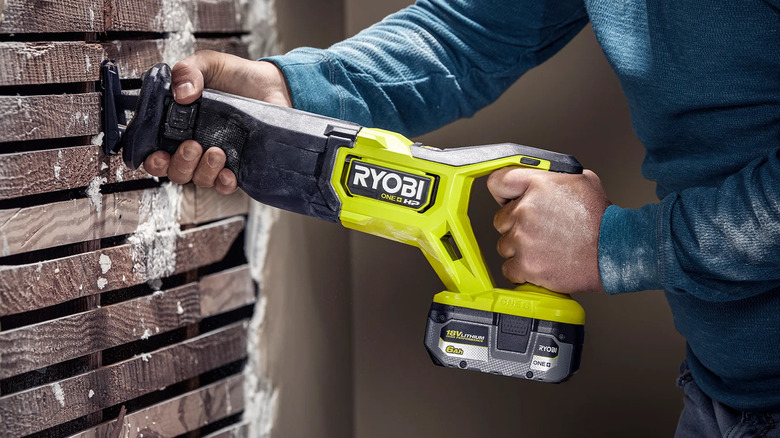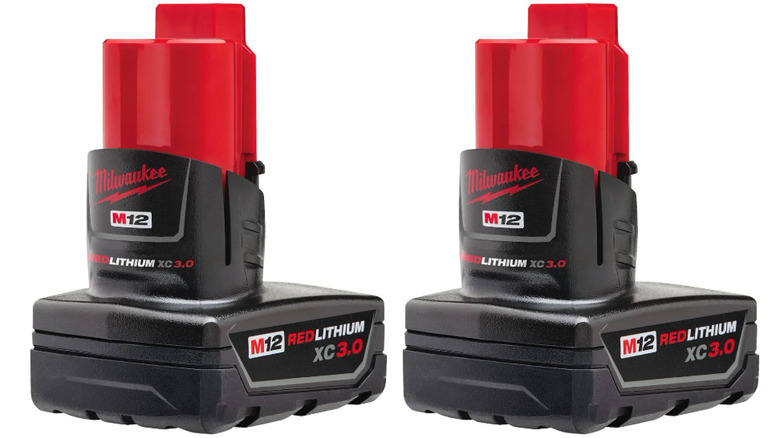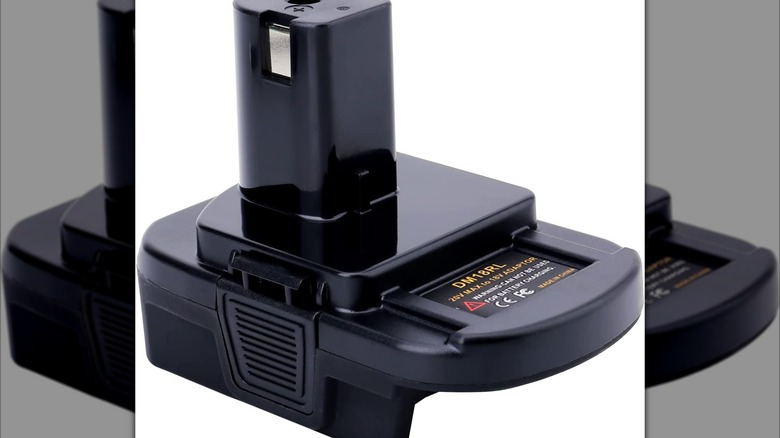Can You Use Milwaukee Batteries On Ryobi Tools?
We may receive a commission on purchases made from links.
When you work with power tools for a long time, either in a professional capacity or as a hobbyist, you tend to amass an eclectic collection of tools and accessories across the major power tool brands. Maybe your preferred brand wasn't available, maybe it was too expensive, or maybe there was a deal too good to pass up; whatever the reason, you've ended up with a mish-mash of tools from the big brands like Milwaukee and Ryobi.
The annoying thing about this particular scenario is that each power tool from each brand in your collection also requires its own corresponding battery pack. Even if you already have a handful of batteries for one brand's tools, as soon as you buy tools from another brand, you're basically locked into its ecosystem. If you feel frustrated by this, you might try to find a cash-saving loophole, such as trying to use the batteries from your Milwaukee tools on your Ryobi tools instead of buying Ryobi batteries. Unfortunately, there is no way to connect a Milwaukee battery pack to a Ryobi tool, at least not without potentially endangering your tools' longevity through the use of unsanctioned third-party battery adapters.
Milwaukee batteries do not fit onto Ryobi tools
In the case of some power tool battery packs, such as DeWalt or Makita, it would be understandable to assume that they're all the same thing at first glance. Many power tool batteries do clip onto their respective tools in a similar manner, differentiated only by small differences in the connection terminals on top. In the specific case of Milwaukee batteries and Ryobi tools, though, it's pretty clear right away that this connection isn't going to work.
Milwaukee's M18 18V battery packs use the traditional connecting rail system to latch onto a tool's battery receiver. You slide it onto the tool's rails, and it clicks into place. Ryobi, on the other hand, uses a proprietary system for its ONE+ 18V batteries, wherein the terminal juts upward and is inserted into a small hole on the tool. There is no way for a Milwaukee battery to even attach to a Ryobi tool, and even if it could, the terminals wouldn't be anywhere near the tool's receiver. Technically, Ryobi does have another line of batteries that use connecting rails, its 40V line specifically, but much like how you can't use 40V batteries in 18V tools, an 18V Milwaukee battery wouldn't fit in a 40V Ryobi tool either.
There are adapters from third parties, but using them isn't a great idea
For both power tool batteries that look similar and those that look completely different, like Ryobi's, there is a longstanding interest in trying to circumvent physical connection lockouts and use any battery on any tool, regardless of brand. This interest manifests as various battery adapters, sold by third-party brands on platforms like Amazon. The way these adapters work is by receiving the battery's terminals on their bottom, then plugging their top into another brand's tool. A Milwaukee-to-Ryobi adapter, for instance, would have a flat bottom with connecting rails to receive the Milwaukee battery, and the distinctive upward stalk of a Ryobi battery to insert into a Ryobi tool.
In the most literal sense, using one of these adapters would allow your Ryobi tool to receive power from a Milwaukee battery. However, using a battery adapter isn't a great idea if you're looking to keep your tools healthy and functional. Both Milwaukee and Ryobi batteries and tools are equipped with unique microprocessors that, in addition to locking out products from other brands, work to regulate and optimize the flow of energy. When you connect a Milwaukee battery to a Ryobi tool, that microprocessor is bypassed, forcing unregulated energy to flow. This can result in either underwhelming, undervolted performance from the tool or a full-on overload that completely burns out the tool's motor. Rather than getting convenient power, you could end up ruining your power tool batteries completely in this way. If you happen to break a tool or battery from using a battery adapter, neither Milwaukee nor Ryobi will service or replace it, as using third-party accessories violates the warranty.


